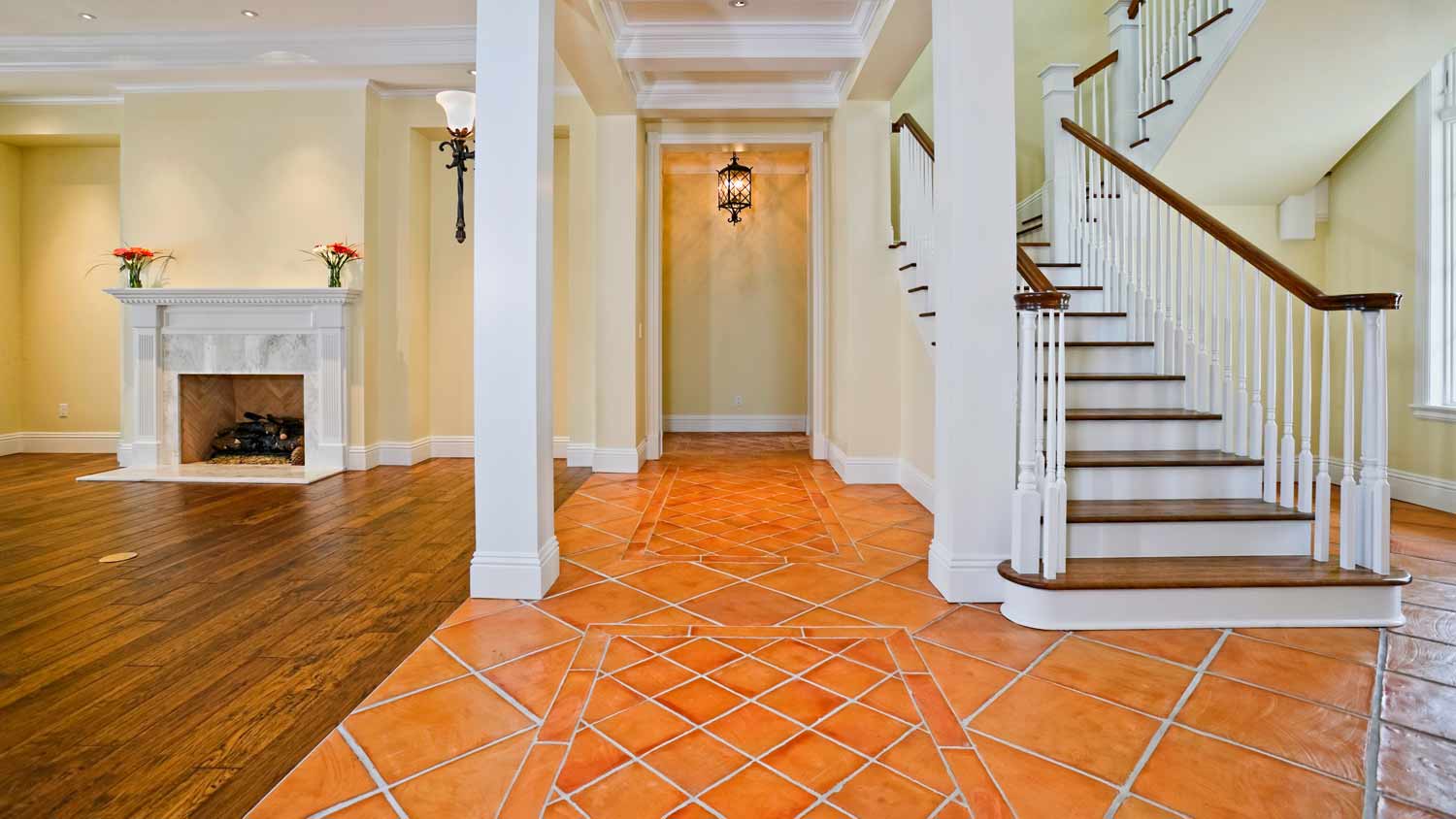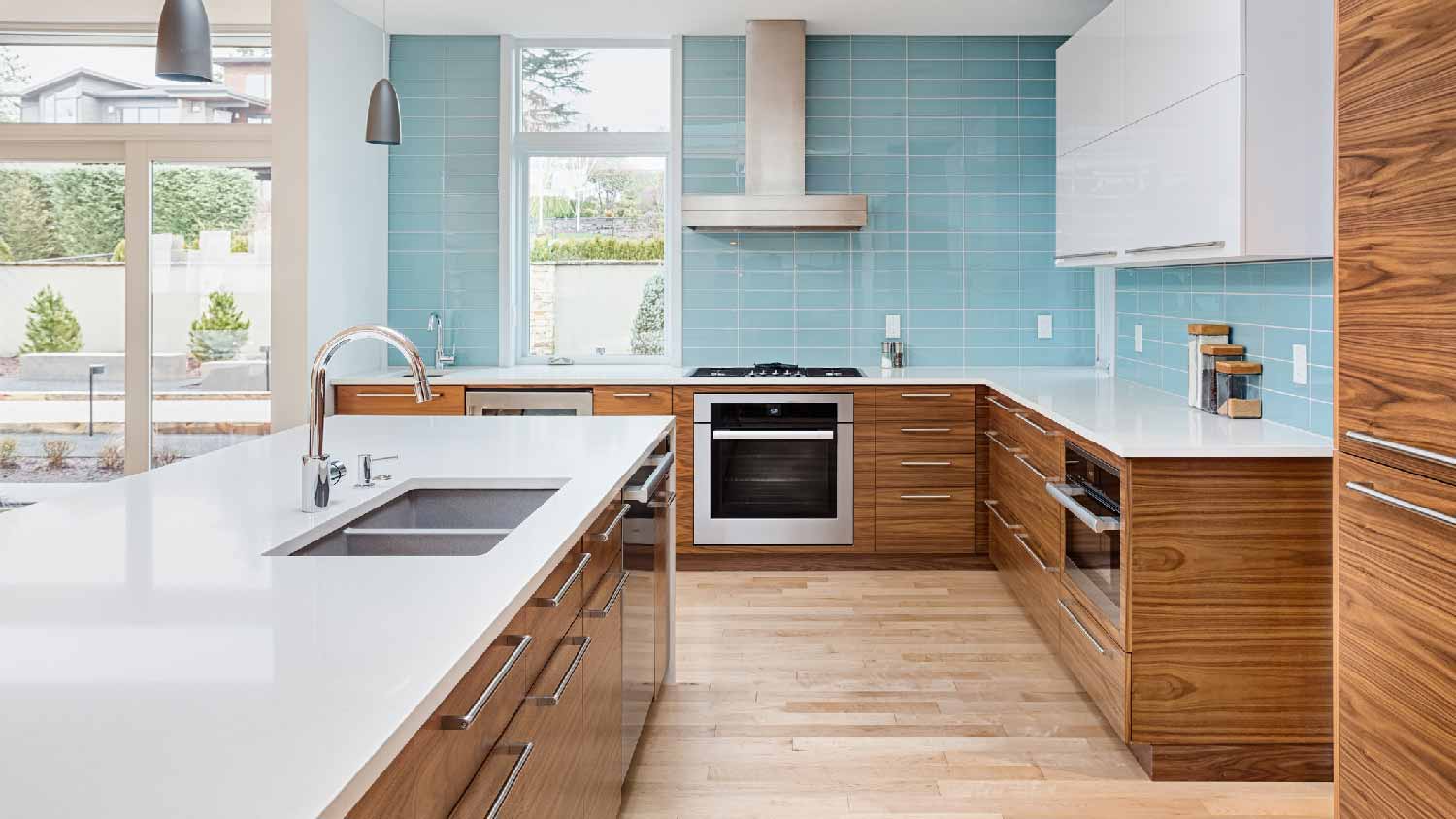
Installing new baseboards can totally refresh the look of your walls. Learn about the cost to install baseboards in your home.
Average vinyl floor repairs cost between $440 and $630, depending on the type of damage, materials, and labor required. The average vinyl floor repair cost is $500.


Vinyl floor repairs can address scratches, tears, water damage, and more.
Vinyl floor repair costs vary by damage type, materials, and labor, with an average range of $2 to $9 per square foot.
Sheet vinyl is cheaper to repair than vinyl planks or tiles.
Professional repairs cost $30 to $70 per hour and ensure seamless results and a longer floor lifespan.
Timely repairs help prevent further damage and maintain home value.
Vinyl floor repair cost is a key concern for homeowners facing damaged flooring. On average, vinyl floor repairs cost $440 to $630, with most projects costing an average of $500. Expect to pay $2 to $9 per square foot for common repairs, depending on the extent of damage and material type. Labor rates commonly range from $30 to $70 per hour.
Caring for vinyl flooring helps protect your investment. This guide explains what drives repair costs, how to decide between repair and replacement, and ways to save on your next project.
Understanding the factors that influence vinyl floor repair cost can help you budget wisely and make informed decisions for your home.
The type of repair needed is one of the biggest drivers of cost. Common vinyl floor repairs include scratch removal, seam repair, plank or tile replacement, patching tears or holes, water damage remediation, and subfloor repair. Each type varies in complexity and price.
| Repair Type | Description | Average Cost |
|---|---|---|
| Scratch/scuff removal | Buffing or treating minor surface marks | $50–$150 |
| Seam repair | Resealing or re-gluing separated seams | $100–$250 |
| Plank/tile replacement | Swapping out damaged planks or tiles | $150–$400 |
| Patching tears/holes | Filling or patching small to medium areas | $100–$600 |
| Water damage repair | Removing and replacing water-damaged vinyl/flooring | $200–$1,200 |
| Subfloor repair | Addressing damaged or weakened subfloor | $250–$1,200 |
Scratches and scuffs are common with vinyl flooring, especially in high-traffic areas. While these marks are often cosmetic, removing them can restore the floor’s appearance and prevent dirt from settling in. Most homeowners need this type of repair every few years. Surface scratch removal is straightforward, using buffing or specialty cleaners, and costs between $50 and $150.
Seams can separate or lift over time, jeopardizing the floor’s moisture protection and visual appeal. Seam repair is important, especially in kitchens and bathrooms where water exposure is common. Resealing or re-gluing seams is a moderately frequent repair, costing $100 to $250, depending on the length and location of the seam.
Replacing individual planks or tiles is necessary when damage is too deep for simple repair, such as from deep gouges or burns. This repair is common with luxury vinyl plank (LVP) and luxury vinyl tile (LVT) flooring. Matching existing flooring is key, and labor for removing and installing new pieces can bring costs to $150 to $600 per section.
Tears and holes occur from dropped objects, pet claws, or heavy furniture. Patching can be a durable solution if done properly, but matching the pattern and color is critical. Small patches are less expensive, while larger areas can require significant blending. Expect to pay $100 to $350, depending on the patch size.
Water damage can cause vinyl flooring to bubble, warp, or lift, sometimes affecting the subfloor underneath. This type of repair is urgent to prevent mold and further structural damage. Water-related repairs are less frequent but more expensive, ranging from $200 to $1,200, especially if subfloor work is needed.
If the subfloor beneath the vinyl is damaged, repairs become more complex. Signs include soft spots, sagging, or persistent odors. Subfloor repair is needed when moisture or impact has compromised the floor’s base, and costs range from $250 to $1,200, depending on the extent of the damage.
The cost to repair vinyl floors can vary based on whether you have sheet vinyl, luxury vinyl plank (LVP), or luxury vinyl tile (LVT). Each type of vinyl floor has unique repair needs and challenges when matching materials.
| Vinyl Flooring Type | Average Cost per Sq. Ft. |
|---|---|
| Sheet vinyl | $3.50–$5 |
| LVP (plank) | $9.50–$12 |
| LVT (tile) | $9.50–$12 |
Sheet vinyl often requires larger patches or seam repairs, while LVP and LVT repairs may involve swapping individual pieces. Plank and tile repairs can be more expensive if the original color or pattern is discontinued.
Brand reputation and availability can affect repair costs. Well-known brands often offer better warranty support and easier material sourcing, which can lower overall costs. However, some premium brands use proprietary designs or limited-edition colors, making repairs more expensive if matching materials are hard to find. If your vinyl floor is from a discontinued line, expect to pay more for special orders or creative patching.
The area that needs repair directly impacts the total cost. Small spot repairs are less expensive, while larger sections increase labor and material costs.
| Repair Area Size (Sq. Ft.) | Description | Average Cost |
|---|---|---|
| 10 | Small spot or patch | $20–$90 |
| 25 | Moderate area | $50–$225 |
| 50 | Large area or multiple | $100–$450 |
Addressing small issues promptly helps avoid more extensive and costly repairs in the future.
Material quality plays a significant role in vinyl floor repair cost. Standard vinyl is less expensive to repair, while premium products, specialty finishes, or discontinued designs increase costs. Sourcing matching materials can add to the price, especially if you need to order from specialty suppliers or dispose of old materials responsibly.
Manufacturer or installer warranties can help offset repair costs. Many warranties cover defects, seam failures, or premature wear, but accidental damage is often excluded. Check your warranty paperwork before scheduling repairs. If your repair is covered, you may only pay for a service call or deductible, saving significant money.
Some flooring companies offer maintenance plans that include annual inspections and minor repairs. These plans can help catch small issues early and reduce the risk of major damage. Maintenance plans cost $100 to $300 per year and can be a good investment for high-traffic homes or rental properties.
Vinyl floor repairs are performed by flooring contractors, handymen, or vinyl specialists. Labor rates average $30 to $70 per hour, with simple repairs taking one to two hours and complex jobs requiring half a day or more. Minimum service fees may apply, especially for small repairs. Emergency or after-hours repairs can increase costs by 20% or more.
Where you live affects vinyl floor repair cost. Urban areas often have higher labor rates, while rural regions may have fewer available pros. In-home location also matters; repairs in kitchens, bathrooms, or basements may cost more due to moisture exposure or accessibility challenges.
Additional services can increase the total cost of your vinyl floor repair. Common add-ons include:
Removing and reinstalling baseboards: $75 to $150
Subfloor moisture testing: $50 to $150
Mold remediation: $500 to $3,000
Including these services in your estimate helps avoid surprises.
Deciding whether to repair or replace vinyl flooring depends on several factors: the age and condition of your floor, the extent of the damage, cost differences, warranty coverage, and whether you can match the existing material. A common rule is that if the vinyl floor repair cost exceeds 50% of the replacement cost, replacement may be the smarter choice.
Always consider the long-term value and appearance of your flooring when making this decision.
While a vinyl floor isn’t the most complicated thing to repair yourself, hiring a local flooring professional can save you the headache. Pros bring experience and specialized tools, while a DIY mistake can result in damage—or even void your floor’s warranty.
Hiring a flooring pro to repair your vinyl floor has clear advantages:
Professionals know how to tackle vinyl repair quickly.
A pro will have all the tools to do the job right.
Hiring a reputable installer won’t void your floors warranty.
Experts can complete the job without causing any further damage.
A DIY mistake could result in a wonky floor.
Pros will offer a seamless result the first time.
An expert eye can spot further damage that a homeowner may miss.
Homeowners who want to assist in floor repair can tackle these tasks:
Clear the repair site to ensure professionals have easy access.
Thoroughly clean the floors before the pro arrives.
Tidy up and dispose of old flooring.
Consider these cost-saving strategies to make your vinyl floor repairs more budget-friendly:
Get multiple quotes from local vinyl flooring repair pros before committing.
Address minor damage promptly to prevent larger, costlier repairs.
Use leftover or remnant materials for small patch jobs.
Maintain floors regularly to minimize future repair needs.
Check for warranty coverage before paying out of pocket.
Consider DIY for simple repairs if you have the skills and tools.
Schedule repairs during off-peak seasons for potential discounts.
Outline the location and severity of the damage.
Ask how you should prepare the repair site, including clearing furniture and cleaning.
Have a budget in mind and discuss the repair methods that work for you and your home.
Home is the most important place on earth, which is why Angi has helped more than 150 million homeowners transform their houses into homes they adore. To help homeowners with their next project, Angi provides readers with the most accurate cost data and upholds strict editorial standards. We extensively research project costs to develop the pricing data you see, so you can make the best decisions for you and your home. We rely on reputable sources, including the U.S. Bureau of Labor Statistics, academic journals, market studies, and interviews with industry experts—all to ensure our prices reflect real-world projects.
Want to help us improve our cost data? Send us a recent project quote to [email protected]. Quotes and personal information will not be shared publicly.
From average costs to expert advice, get all the answers you need to get your job done.

Installing new baseboards can totally refresh the look of your walls. Learn about the cost to install baseboards in your home.

Updated flooring can make any room in your home feel brand new. Find out flooring installation costs, from materials to labor costs.

Most people wrap floor removal into a larger project, but the itemized cost to remove laminate flooring depends on the size and state of the floor.

How much does a Saltillo tile floor cost? It depends on the size of your space, but on average, you’ll pay between $6 and $28 per square foot for this tile.

No more tiptoeing on cold tiles! Say goodbye to chilly feet with this DIY guide on how to install heated floors and embrace the luxury of warmth.

Updated flooring can make any room in your home feel brand new. Explore flooring installation costs in New York, NY, from materials to labor costs.